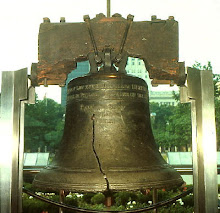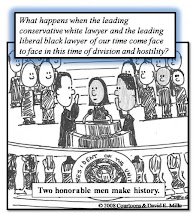The headline reads that the 'Fourth DCA has affirmed Judge Lebow.' Those new to this blog or this issue may know not of which we speak.
Simply, here in County Broward, a cataclysmic error of seismic proportion was made by the Office of the State Attorney. In their zeal to prosecute, maybe even a guilty man, some of their own chose to listen in furtively on taped conversations of inmates with their lawyers as they strategized for trial. As you can see from the tape above, way back in 1963, a folksy sheriff named Andy Griffith even knew better.
The prosecution justified their arguments on the grounds that public notice had been given to the incarcerated that their conversations may be eavesdropped upon. They warned, they contend, that anything anyone said could be used against them, and we gave you notice. To do so, the forces of law surrendered their badge of righteousness and chose to become elements of injustice, invading the sanctity of the attorney client privilege for the expediency of the moment; to score a victory on a particular case whilst shattering the integrity of the criminal justice process.
Their incursions into privacy so discovered, atttorneys for the accused sought a mistrial. Judge Lebow declined to go so far, concluding instead that the sanction warranted for the prosecutorial malfeasance of a few was to exclude as prosecutors the entire State Attorneys' office, the voices of incursion having echoed throughout their chambers. So Judge Lebow declared. Today, she was affirmed by appellate powers greater than she.
What follows is the DCA decision, as first posted this afternoon on the JAABLOG website, once again ahead of the courthouse curve. When does Bill have time for court?http://jaablog.jaablaw.com/2009/02/24/4th-dca-backs-lebow.aspx?ref=rss
State v. Martinez
"Even if we were to conclude that Weir and Gaines are not controlling and that extraordinary writ jurisdiction may be invoked to review an order entered after a criminal trial commences, we would deny the petition in this case because the trial court did not depart from the essential requirements of law. See Pettis, 520 So. 2d 250; see also State v. Smith, 951 So. 2d 954, 958 (Fla. 1st DCA 2007) (recognizing that the standard for certiorari review “pertains to the seriousness of the error, not the impact of the ruling”). The trial court entered a thoughtful order after an extensive evidentiary hearing.
The State has provided the transcripts of the hearing, which we have reviewed. The record supports the trial court’s findings that the case law cited is distinguishable and that there was no waiver of the attorney-client privilege based on the circumstances in this case. Although the order states that the trial court did not need to consider the contents of the calls in making its ruling, the recordings were played during the hearing, the contents were discussed at length, and the trial court expressly found that the calls contained trial strategy. The order also recognizes that the conversations included privileged information that has been discussed throughout the State Attorney’s Office.
The failure to address the contents of the conversation in the order and expressly find actual prejudice is not “a violation of a clearly established principle of law resulting in a miscarriage of justice.” See Pettis, 520 So. 2d at 254. Even if we had jurisdiction, we would conclude that the State has not shown a preliminary basis for relief, and a response from the defendant would not be necessary. Fla. R. App. P. 9.100(h)."
Here is the previous Broward Law Blog piece on the subject, calling for the 4th DCA to affirm. It is great that they have.
http://browardlawblog.blogspot.com/search/label/Judge%20Lebow
































No comments:
Post a Comment